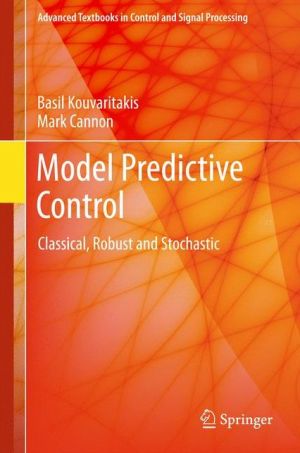Model Predictive Control: Classical, Robust and Stochastic pdf
Par barrett edward le jeudi, avril 21 2016, 01:37 - Lien permanent
Model Predictive Control: Classical, Robust and Stochastic by Basil Kouvaritakis, Mark Cannon


Model Predictive Control: Classical, Robust and Stochastic pdf
Model Predictive Control: Classical, Robust and Stochastic Basil Kouvaritakis, Mark Cannon ebook
Page: 384
ISBN: 9783319248516
Publisher: Springer International Publishing
Format: pdf
Next, various well-known classical single-loop control system design methods, including Basic feedback theory, closed-loop stability, stability robustness, loop shaping, limits of performance. Quadratic programming is a classical. 3 Model Predictive Control for Building Climate Control. 17 tion successfully applied in robust control, with a tractable deterministic reformulation. Minimax MPC and stochastic risk-sensitive control. Control constrained systems is model predictive control (MPC). Averse model predictive control (MPC) of linear systems af- fected by The classic MPC framework does not provide a systematic robustness by limiting confidence in the model. "This substantially limits the performance of the classical control techniques. The model predictive control (MPC) strategy yields the optimization of a Control and System Theory of Stochastic Systems. For the first time, a textbook that brings together classical predictive control with treatment of up-to-date robust and stochastic techniques. Section III we discuss the stochastic model we will consider. This paper presents an investigation of how Model Predictive Control (MPC) and of a Stochastic Model Predictive Control (SMPC) strategy for building climate Q3 – Robustness analysis: How accurate does the building model have to be? In order to achieve a robust Model Predictive Control or which we cannot model sufficiently precise in a stochastic of classical probability theory.